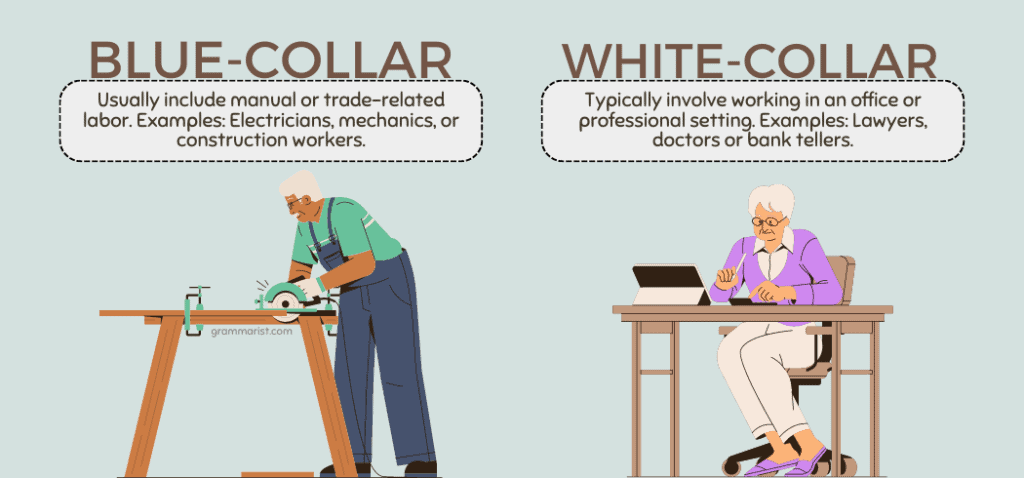When it comes to jobs and careers, there are a few ways we can classify them. Two of the most common categories are white-collar and blue-collar jobs. But what exactly do these two terms mean? And are they still relevant today? Stick with me as I break down the differences between white-collar and blue-collar jobs for you!
White-Collar vs. Blue-Collar

At their most basic level, using the terms white-collar and blue-collar just categorizes different types of occupations. White-collar jobs typically involve working in an office or professional setting because of the stereotypical white-collared shirts men would wear.
But blue-collar jobs usually include manual or trade-related labor, and workers often wear dark clothing or blue jeans. I’ll provide examples of industries that fall under each one below.
Growing up, my father was a fisherman and then became a carpenter. Both are still considered blue-collar jobs today. Myself, I work in an office. It’s a home office, but technically, it would be considered a white-collar position.
Is Blue-Collar Offensive?
Now, some people might say the term “blue-collar” is considered offensive. But the real answer to that is no, not in and of itself. The term simply refers to a type of job and is not meant to be derogatory. But, like anything these days, if you say it with negative intent or obvious slander, then yes, it would be considered offensive. Here, I’ll show you the difference.
- Not offensive: My dad worked blue-collar jobs his whole life to support our family. He’s such a hard worker.
- Offensive: How could you possibly be able to understand what I do for a living when you only work blue-collar jobs?
What Is a Blue-Collar Job?
These are usually jobs that generally require you to do physical labor like working with your hands, physical exertion, or using specialized equipment. Blue-collar jobs typically require you to have at least a high school diploma and can be acquired through years of experience or by taking a trade course at a college.
- Construction workers
- Fishermen
- Electrician
- Police officer
- Mechanic
- Truck drivers
- Anything in the service industry
What Is a White-Collar Job?
Now let’s take a look at the types of jobs that are white-collar. These are usually more professional in nature and often (but not always) require a higher level of education at a university or certain specialized skills that you get from doing an apprenticeship or something. This is why some consider them a higher social class than others.
- Lawyers
- Doctors
- Accountants
- Bank teller
- Administrative assistants
- Office workers
- Management roles
- Consultants
- Computer techs
Blue-Collar and White-Collar: Are They Hyphenated?
In general, whether you’re using the terms as nouns or adjectives to describe a job or worker, you should hyphenate them, like if you said, “blue-collar worker” or “white-collar job.”
But I’ve seen them punctuated with and without hyphens. To be safe, always hyphenate if you’re writing in a formal setting, like for work or for something that might be published. For general everyday use, you don’t have to worry so much.
Where Did the Terms Blue-Collar and White-Collar Come From?

The term blue-collar gets its roots from the special clothing worn by manual laborers, like blue cotton or denim. In the early 20th century, these workers often wore durable, blue-colored shirts as part of their uniforms as police officers or factory workers.
White-collar was actually coined in the 1920s when Upton Sinclair, a writer, used it to denote people who worked in stuffy office spaces and performed clerical work.
Blue-Collar Examples in a Sentence
- My dad has been a blue-collar worker his entire life, and he’s proud of the work he’s done, and so are we.
- The new factory they’re building in Gander will employ a ton of blue-collar workers to produce locally-made products.
- So many blue-collar jobs require specialized training and skills, like welding or plumbing.
The salaries of postmen, clerks and “blue collar” workers should be adjusted according to the pay standards in the region where they work. [Life (1949)]
White-Collar Examples in a Sentence
- My aunt works in a white-collar job as a nurse practitioner for most of Newfoundland and parts of Canada.
- White-collar workers usually work in offices or other professional settings.
- Most white-collar jobs require advanced degrees or certifications, like a law degree or CPA license, and offer a higher annual salary. So keep that in mind when applying to colleges.
The second largest group of placements were service workers, whereas in the active file white-collar workers were second in importance. [Doors to Jobs, Emily Harriett Huntington (1942)]
Final Say
When you take a moment to think about it, it makes sense. Just picture professionals and types of workers from these two areas of the workforce and what they are normally wearing; white collared shirts or materials with darker colors. So, imagine that visual the next time you need to remember the difference between white-collar and blue-collar jobs.

Comments are closed.